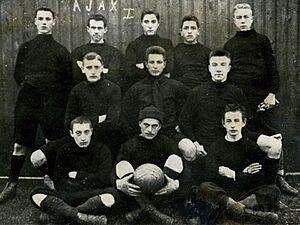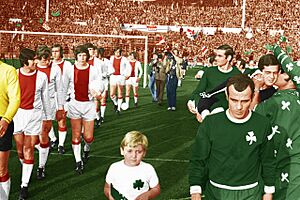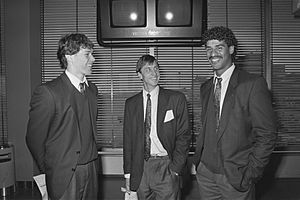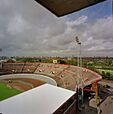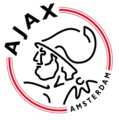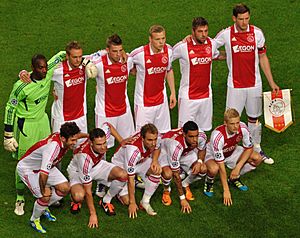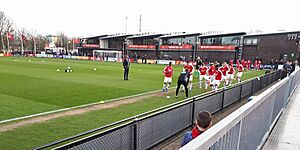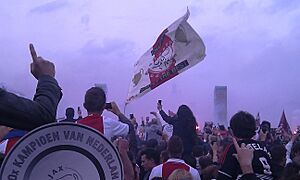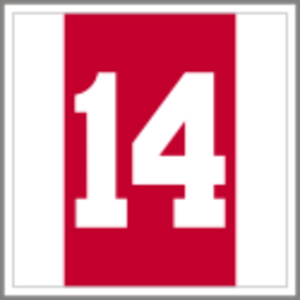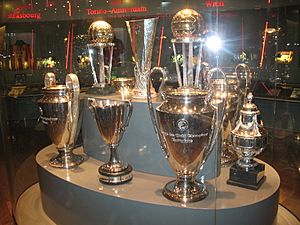AFC Ajax facts for kids
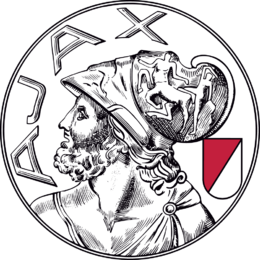 |
|||
| Full name | Amsterdamsche Football Club Ajax | ||
|---|---|---|---|
| Nickname(s) | de Godenzonen (Sons of the Gods) de Joden (the Jews) Lucky Ajax |
||
| Founded | 18 March 1900 | ||
| Ground | Johan Cruyff Arena | ||
| Capacity | 55,865 | ||
| Owner | AFC Ajax N.V. (Euronext Amsterdam: AJAX ) | ||
| CEO | Menno Geelen | ||
| Head coach | John Heitinga | ||
| League | Eredivisie | ||
| 2022–23 | Eredivisie, 3rd of 18 | ||
|
|
|||
AFC Ajax, often just called Ajax, is a famous Dutch professional football club from Amsterdam. They play in the Eredivisie, which is the top football league in the Netherlands. Ajax is named after a brave Greek hero.
Ajax is known as the most successful club in the Netherlands. They have won the Eredivisie titles 36 times and the KNVB Cup 20 times. Since the league started in 1956, Ajax has always played in the Eredivisie. They are one of the "big three" clubs in the country, along with Feyenoord and PSV Eindhoven.
In the 20th century, Ajax was one of the best clubs in the world. They were even named The World's Club Team of the Year in 1992. Ajax is one of only five teams allowed to keep the European Cup trophy forever. In 1972, they won the continental treble, meaning they won the Eredivisie, KNVB Cup, and the European Cup all in one season. They also won the first European Super Cup in 1973.
Ajax's more recent international wins include the 1995 Intercontinental Cup, 1995 UEFA Super Cup, and the 1995 Champions League. They beat Milan in the final that year. In 1995, World Soccer magazine called Ajax the World Team of the Year.
Ajax is one of only four teams to win the continental treble and the Intercontinental Cup or Club World Cup in the same year. They have won the Intercontinental Cup twice and the 1991–92 UEFA Cup. Ajax plays its home games at the Johan Cruyff Arena. Before this, they played at De Meer Stadion and the Amsterdam Olympic Stadium. Ajax is famous for finding and training young football stars through its excellent youth system.
Contents
- Club History and Achievements
- Youth Academies
- Home Stadiums
- Club Crest and Colours
- Financial Information
- Other Teams at Ajax
- Other Sports at Ajax
- Club Rivalries
- Ajax Supporters
- Historical Jewish Connection
- Current Players and Staff
- Club Honours and Trophies
- Club van 100
- Team Tournaments Hosted by Ajax
- See also
Club History and Achievements
Ajax was started in Amsterdam on March 18, 1900. They moved up to the highest Dutch football league in 1911. Their first big win was in 1917, when they won the KNVB Beker, which is the national cup. The next season, Ajax became national champions for the first time. They won again in 1918–19, becoming the only team to win the Dutch league without losing a single game.
In the 1930s, Ajax became the most successful Dutch team of that decade, winning five national championships. They won their second KNVB Cup in 1942–43. In 1956, the new professional league, the Eredivisie, began. Ajax was one of the first teams in it and became the first champions under this new system.
The Golden Era of Total Football
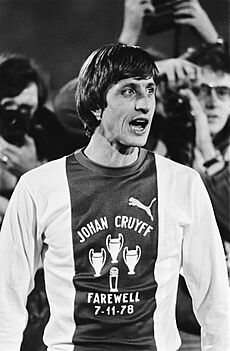
In 1965, Rinus Michels became Ajax's manager. He brought in his special style of play called Total Football. This style became famous with both Ajax and the Dutch national team. Around the same time, Johan Cruyff, who many consider the best Dutch footballer ever, started playing for Ajax. Together, Michels and Cruyff led Ajax to its most successful period. They won seven Eredivisie titles, four KNVB Cups, and three European Cups.
Ajax won the Dutch championship three years in a row from 1966 to 1968. In 1969, they reached the European Cup final but lost to Milan. In the 1966–67 season, Ajax scored a record 122 goals in the Eredivisie and won their first league and cup double. They won another double in 1969–70.
The 1970–71 season was amazing. Ajax won the KNVB Cup and the European Cup. They beat Panathinaikos 2–0 in the final. Cruyff was named European Footballer of the Year. After this, Michels left, and Ștefan Kovács became manager. In Kovács' first year, Ajax won a treble: the European Cup, Eredivisie, and KNVB Cup. The next season, they won the 1972 Intercontinental Cup and kept their Eredivisie and European Cup titles. This made them the first club to win three European Cups in a row since Real Madrid in the 1950s.
In 1973, Cruyff moved to Barcelona, and Kovács also left. This marked the end of this very successful time for Ajax.
Later Successes and Challenges
In the early 1980s, Cruyff returned to Ajax, and young stars like Marco van Basten and Frank Rijkaard emerged. The team won back-to-back Eredivisie titles in 1982 and 1983. After Cruyff left again in 1983, van Basten became Ajax's main player, scoring the most goals in the Eredivisie for four seasons.
Cruyff came back as manager in 1985. In his first season, Ajax scored 120 goals but finished second. The next season, they won the European Cup Winners' Cup, their first European trophy in 14 years. After this, Cruyff left again, and Rijkaard and van Basten were sold.
In the 1990s, under manager Louis van Gaal, Ajax saw new talents like Dennis Bergkamp. Ajax won the UEFA Cup in 1992. This made them the second club to win all three major European club competitions.
After Bergkamp left in 1993, van Gaal brought back Rijkaard. He also relied on young players from the academy like Frank and Ronald de Boer, Edwin van der Sar, Clarence Seedorf, Edgar Davids, and Patrick Kluivert. This team won the Dutch championship three times in a row from 1994 to 1996. In 1994–95, Ajax had an amazing season, winning the Eredivisie without losing a single game. They also won the 1995 UEFA Champions League final by beating Milan 1–0, with a goal from 18-year-old Patrick Kluivert. They reached the final again in 1996 but lost to Juventus on penalties.
After this, many key players and van Gaal left. The 2000s were not as successful for Ajax, with only two Eredivisie titles. However, the academy kept producing stars like Wesley Sneijder and Rafael van der Vaart.
Recent Seasons
In 2010, Frank de Boer became manager and led Ajax to its 30th league title in 2010–11. They won four league titles in a row from 2011 to 2014, a club record.
Peter Bosz took over in 2016 and led Ajax to the 2017 UEFA Europa League final, their first European final in 21 years. They lost to Manchester United. Their team was the youngest ever in a European final.
The 2018–19 season was exciting for Ajax in the UEFA Champions League. They beat strong teams like Real Madrid and Juventus to reach the semi-finals. Dušan Tadić played incredibly well against Real Madrid.
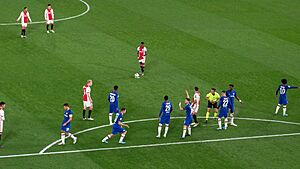
In the semi-final, they faced Tottenham Hotspur. Ajax won the first game away and scored two goals early in the second game, leading 3–0 overall. But Tottenham scored three goals in the second half, including one in the last minute, and Ajax lost because of the away goals rule.
The Eredivisie season of 2019–20 was stopped early due to a global event, and no champion was named, even though Ajax was in first place. They still qualified for the 2020–21 UEFA Champions League. In the 2020–21 season, Ajax won both the national title and the KNVB Cup.
In the 2021–22 AFC Ajax season, Ajax became Dutch champions again. They won all six of their Champions League group matches. However, they were knocked out in the round of 16 by Benfica.
For the 2022–23 season, Alfred Schreuder became coach. Many key players left, but new ones were bought. Ajax started well in the Eredivisie but struggled in the Champions League, losing 1–6 at home to Napoli, their biggest European defeat ever. After a bad run, Schreuder was replaced by John Heitinga. Ajax finished third in the Eredivisie, their lowest spot since 2008–09. They also lost the KNVB Cup final to PSV.
In the 2023–24 season, Ajax had a very tough start, even ending up in last place in the Eredivisie for the first time in club history. John van 't Schip took over as coach and helped the team climb to 5th place. They were eliminated from the Conference League by Aston Villa and lost in the KNVB Cup to an amateur team.
The 2024–25 season saw a big rebuild for Ajax. Francesco Farioli became the new head coach. Ajax finished second in the Eredivisie to PSV, despite being ahead by 9 points with five matches left. Farioli left the club in May 2025.
Youth Academies
Ajax is very famous for its amazing youth program. This program has helped many Dutch football stars grow up, like Johan Cruyff, Edwin van der Sar, Dennis Bergkamp, Patrick Kluivert, Marco van Basten, Wesley Sneijder, Frenkie de Jong, and Matthijs de Ligt. These players all started in the Ajax youth system. Ajax also provides many players for the Dutch national youth teams.
Ajax has also worked with clubs in other countries to find young talent. For example, they had a partnership with Ajax Cape Town in South Africa.
In 1995, when Ajax won the UEFA Champions League, almost the entire Dutch national team was made up of Ajax players! This shows how good their youth academy is.
In 2011, Ajax opened its first youth academies outside the Netherlands in Greece, called the Ajax Hellas Youth Academy. In 2016, Ajax started the ACA (Ajax Coaching Academy) to share its football knowledge with players and coaches around the world.
Home Stadiums
Ajax's first stadium was built in 1911 and was made of wood. It was called Het Houten Stadion (The Wooden Stadium). Ajax also played in the Olympic Stadium, which was built for the 1928 Summer Olympics in Amsterdam.
In 1934, Ajax moved to De Meer Stadion in east Amsterdam. It could hold 29,500 fans. Ajax played there until 1996. For big European and national games, they often used the Olympic Stadium, which was much larger.
In 1996, Ajax moved to their new home, the Amsterdam Arena, which was renamed the Johan Cruyff Arena in 2018. This stadium cost $134 million to build and can hold 55,865 fans. It has a roof that can open and close. The old De Meer Stadion was taken down, and houses were built there. The famous "AJAX" letters from the old stadium are now at the Johan Cruyff Arena.
Club Crest and Colours
Club Crest Evolution
When Ajax was founded in 1900, their first emblem was just a picture of an Ajax player. In 1928, the club introduced a new logo with the head of the Greek hero Ajax. This logo was changed again in 1990 to a more modern, abstract version. The new logo still shows Ajax's portrait, but it's drawn with only 11 lines, representing the 11 players on a football team. On November 17, 2024, Ajax announced that the classic 1928 logo would return for the 2025–26 season.
-
Logo AFC Ajax (1928-1991, 2021-2022, 2025-).png
Crest of Ajax (1928–1991, 2021–2022, 2025–present)
Team Colours
Ajax first played in all black with a red sash. But soon, they changed to a red and white striped shirt with black shorts. Red, black, and white are the colours of the flag of Amsterdam.
In 1911, when Ajax moved up to the top league, they had to change their uniform. Another team, Sparta Rotterdam, already had the same colours. So, Ajax chose white shorts and a white shirt with a wide, vertical red stripe down the middle. This has been Ajax's famous uniform ever since.
Financial Information
AFC Ajax N.V.
AFC Ajax is the only Dutch club that is listed on the stock exchange, Euronext Amsterdam. This means people can buy shares in the club. They started selling shares on May 17, 1998.
Sponsorships
Ajax's shirts have had different sponsors over the years. TDK sponsored them from 1982 to 1991, and ABN AMRO from 1991 to 2008. Then AEGON became the main sponsor for seven years.
The shirts have been made by different companies like Le Coq Sportif, Puma, Kappa, and Umbro. Since 2000, Adidas has made Ajax's kits.
In 2014, Ajax won the "Football Shirt of the Year" award for their black and rose-coloured away shirt made by Adidas. In November 2014, Ajax signed a big deal with the Dutch cable company Ziggo to be their new shirt sponsor.
Other Teams at Ajax
Reserve Team: Jong Ajax
Jong Ajax (meaning 'Young Ajax') is the reserve team for AFC Ajax. It's mostly made up of young professional players who have come from the youth academy or players who aren't currently playing for the main team.
Jong Ajax has been very successful, winning the Beloften Eredivisie (a league for reserve teams) a record eight times. They have also won the KNVB Reserve Cup three times. Since 2013, Jong Ajax has played in the Eerste Divisie, which is the second-highest professional league in the Netherlands. However, they cannot be promoted to the Eredivisie or play in the KNVB Cup.
Women's Team: AFC Ajax Vrouwen
AFC Ajax Vrouwen is the women's football team of Ajax. They play in the women's eredivisie, the top women's league in the Netherlands. The women's team was started on May 18, 2012. They won their first trophy, the KNVB Women's Cup, by beating PSV/FC Eindhoven 2–1.
Amateur Team: Ajax Zaterdag
AFC Ajax Amateurs, also known as Ajax Zaterdag, is the amateur football club of AFC Ajax. They play their home games at the Sportpark De Toekomst training grounds.
Other Sports at Ajax
Baseball Team (Past)
Ajax used to have a baseball team called Ajax HVA from 1922 to 1972. They won the national baseball title four times. In 1972, the club decided to focus only on football.
Esports Team
In 2016, Ajax started an esports team, which plays professional video games. Koen Weijland was their first player. They have signed other players since then, joining the world of professional gaming.
Club Rivalries
Ajax has some strong rivalries with other football clubs in the Netherlands.
Rivalry with Feyenoord
Feyenoord from Rotterdam is Ajax's biggest rival. Their matches are called De Klassieker ("The Classic"). For a long time, Ajax and Feyenoord were the only two clubs in the Netherlands winning national and international titles. This made their games a test of who was truly the best. The Klassieker is the most famous rivalry in the Netherlands, and the matches are always sold out.
The rivalry is known for being very intense, both on and off the field. There have been incidents between fans, which led to away supporters being banned from both stadiums. A sad event happened on March 23, 1997, when fans from both clubs clashed, and an Ajax supporter was fatally injured. This event is known as the "Battle of Beverwijk".
Rivalry with PSV
PSV is another rival of Ajax. While not as intense as the Feyenoord rivalry, these matches are still very important. The rivalry comes from different ideas about football and the differences between the cities of Amsterdam and Eindhoven. Their games are called "De Topper" ("The Topper"). Both teams have won many trophies. Ajax is known for its "Total Football" style, while PSV often plays with a more direct and strong approach. This creates an interesting battle of football ideas.
Rivalry with AZ Alkmaar
A newer rivalry has grown with AZ from nearby Alkmaar. Since both clubs are in the North Holland province, their games are called "De Noord-Hollandse derby" ("The North Holland derby"). This rivalry became stronger when AZ won the Dutch championship in 2009. The matches are often very competitive. Fans have also had clashes. For example, in December 2011, during a KNVB Cup match, an Ajax supporter ran onto the field and attacked the AZ goalkeeper. This led to the match being stopped.
Ajax Supporters
Ajax has very passionate fan groups, with F-Side and VAK410 being the most famous. The F-Side was started in 1976 and stands behind the goal in the Johan Cruyff Arena. They create a lot of the atmosphere in the stadium. VAK410 was founded in 2001 and is known for its large banners and displays that make the stadium exciting. Both groups stand during the entire match.
In 2010, a study showed that Ajax had about 7.1 million supporters across Europe, which is much more than their rivals Feyenoord and PSV. The study also found that about 39% of people in the Netherlands support Ajax. Many fans also attend Ajax's European matches, showing their strong support.
Supporters Clubs
The Supporters Club Ajax is the largest official supporters club in the Netherlands, with 94,000 members. They organize events and publish the Ajax Life website and a fanzine.
The AFCA Supportersclub is another official supporters' association, with 42,000 members. The Ajax Business Associates (ABA) is the business club for Ajax, where members can enjoy luxury suites at the stadium.
Average Attendance
This chart shows how many people on average attended Ajax's home matches from 1988 to 2018. You can clearly see the difference when they moved from the smaller De Meer Stadion to the larger Johan Cruyff Arena in 1996.
|
|
|
|
|
|
|
|
|
|
|
|
|
|
|
|
|
|
|
|
|
|
|
|
|
|
|
|
|
|
|||||||||||||||||||||||||||||||
| 88/89 | 89/90 | 90/91 | 91/92 | 92/93 | 93/94 | 94/95 | 95/96 | 96/97 | 97/98 | 98/99 | 99/00 | 00/01 | 01/02 | 02/03 | 03/04 | 04/05 | 05/06 | 06/07 | 07/08 | 08/09 | 09/10 | 10/11 | 11/12 | 12/13 | 13/14 | 14/15 | 15/16 | 16/17 | 17/18 |
Mascot
- Lucky Lynx is the official team mascot for Ajax.
Historical Jewish Connection
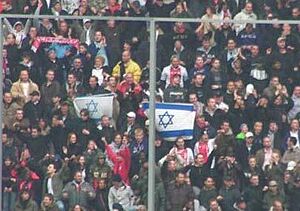
Historically, Ajax was seen by many as having "Jewish roots." This idea started in the 1930s because their home stadium was near a Jewish neighborhood in Amsterdam. Opposing fans would sometimes use offensive chants. In response, some Ajax fans, even if they weren't Jewish themselves, started to embrace this "Jewish" identity. They would chant "Jews, Jews" and use symbols like the Star of David and the Israeli flag.
However, this led to more serious and offensive anti-Semitic chants from rival fans. Because of this, many genuinely Jewish Ajax fans stopped going to games. In the 2000s, the club began to try and encourage fans to move away from this "Jewish" image. A documentary called Superjews was released in 2013, exploring this connection.
Recently, before and after a UEFA Europa League game between the Israeli team Maccabi Tel Aviv and Ajax on November 7, 2024, there were tensions and violence.
Current Players and Staff
Current Squad
|
|
Players on Loan
|
Retired Jersey Numbers
- 14 –
 Johan Cruyff (Forward, 1964–73, 1981–83). This number was retired on April 25, 2007, to honor Johan Cruyff on his 60th birthday.
Johan Cruyff (Forward, 1964–73, 1981–83). This number was retired on April 25, 2007, to honor Johan Cruyff on his 60th birthday.
Notable Former Players
Many famous players have played for Ajax. Some of them include:
- Sjaak Swart (who played the most matches for the club)
- Piet van Reenen (who scored the most goals)
- Dennis Bergkamp
- Edwin van der Sar
- Frank Rijkaard
- Marco van Basten
- Patrick Kluivert
- Wesley Sneijder
- Frenkie de Jong
- Matthijs de Ligt
Club Honours and Trophies
Ajax has won many important trophies, both in the Netherlands and around the world.
| Type | Competition | Titles | Seasons |
|---|---|---|---|
| Domestic | Eredivisie | 36 |
1917–18, 1918–19, 1930–31, 1931–32, 1933–34, 1936–37, 1938–39, 1946–47, 1956–57, 1959–60 |
| KNVB Cup | 20 |
1916–17, 1942–43, 1960–61, 1966–67, 1969-70, 1970–71, 1971–72, 1978–79, 1982–83, 1985–86, 1986–87, 1992–93, 1997–98, 1998–99, 2001–02, 2005–06, 2006–07, 2009–10, 2018–19, 2020–21 |
|
| Johan Cruyff Shield | 9 |
1993, 1994, 1995, 2002, 2005, 2006, 2007, 2013, 2019 |
|
| Continental | UEFA Champions League | 4 | 1970–71, 1971–72, 1972–73, 1994–95 |
| UEFA Europa League | 1 |
1991–92 |
|
| UEFA Cup Winners' Cup | 1 |
1986–87 |
|
| UEFA Super Cup | 2 |
1973, 1995 |
|
| Worldwide | Intercontinental Cup | 2 | 1972, 1995 |
- record
- s shared record
Ajax also won an unofficial UEFA Super Cup in 1972 against Rangers. This win meant Ajax had won every tournament they entered that year (5 in total).
Other Trophies and Awards
Ajax has also won many friendly tournaments, like the Amsterdam Tournament and the Copa Amsterdam. They have received club awards such as:
- World Soccer World Team of the Year: 1995
- France Football European Team of the Year: 1969, 1971, 1972, 1973
- Dutch Sports Team of the Year: 1968, 1969, 1972, 1987, 1995
- IFFHS The World's Club Team of the Year: 1992
- Best Dutch club after 50 years of professional football: 2004
- Football shirt of the Year: 2013–14 (for their black and rose away shirt)
Club van 100
The Club van 100 is a special list of players who have played 100 or more official matches for Ajax. There are over 150 members. The player with the most league appearances is Sjaak Swart, who played 463 league matches for Ajax.
There is also a special team called Lucky Ajax. This team was started by Sjaak Swart. They play at least one match a year, often for charity or to say goodbye to players who are retiring. To play for Lucky Ajax, you usually need to be a member of the Club van 100.
Team Tournaments Hosted by Ajax
Amsterdam Tournament
This tournament started in 1975 to celebrate 700 years of Amsterdam's history. Ajax hosted it every summer until 1992. It came back in 1999. Four teams played, and a special scoring system was used: teams got an extra point for each goal scored, to encourage attacking play. Ajax has won this tournament a record ten times.
Copa Amsterdam (Youth)
Started in 2005, the Copa Amsterdam is an international friendly football tournament for Under-19 youth teams. Ajax and the city of Amsterdam organize it at the Olympic Stadium. Each summer, U-19 teams from top clubs around the world, like Barcelona and Juventus, are invited to play.
Future Cup (Youth)
The AEGON Future Cup began in 2010. It's an international friendly tournament for Under-17 youth teams, organized by Ajax and their main sponsor, AEGON. It's held every year at the Johan Cruyff Arena and the Sportpark De Toekomst, which means "The Future" in Dutch. Young teams from clubs like Manchester United and Bayern Munich have played in it. Ajax has won this trophy five times.
See also
 In Spanish: Ajax de Ámsterdam para niños
In Spanish: Ajax de Ámsterdam para niños


